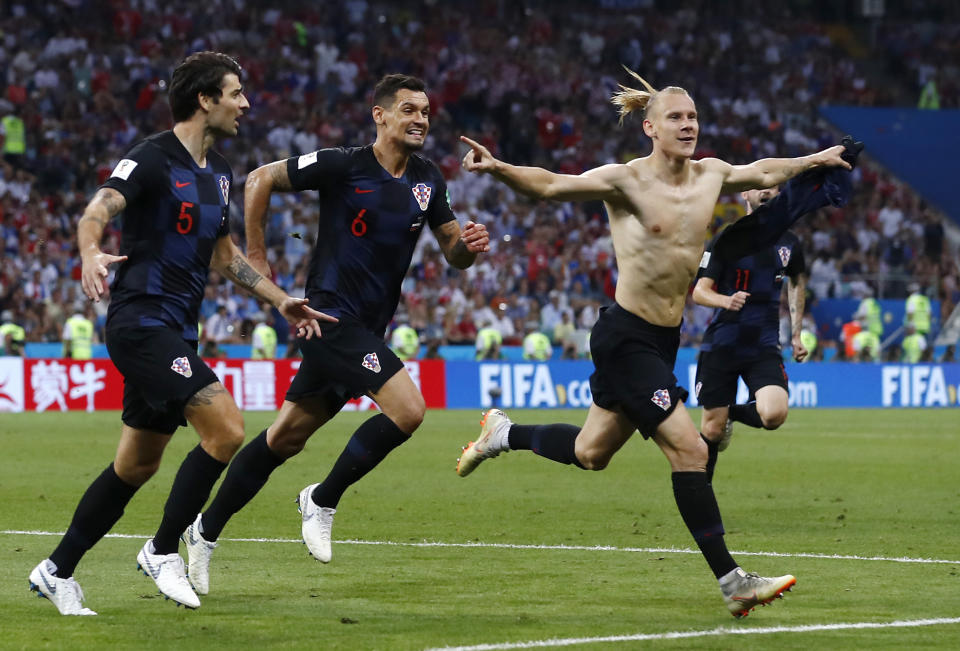Croatia defender ruffles Russia with political comment after World Cup win
Croatia’s Domagoj Vida will not be suspended for his team’s World Cup semifinal against England. But he did draw a warning from FIFA, and he did ignite anger throughout Russia with comments made after Croatia’s elimination of the hosts.
Vida scored one of Croatia’s two goals and one of its four penalties in a dramatic quarterfinal shootout victory over Russia. After the game, he and former midfielder Ognjen Vukojevic, now a national team assistant, took to Facebook to share a message with fans: “Glory to Ukraine!” Vida shouted.
The slogan carries anti-Russian connotations. It was adopted by Ukrainian nationalists before and after Russia’s annexation of Crimea in 2014. The two countries remain embroiled in an ongoing conflict that has taken the lives of thousands.
So just as Switzerland’s win over Serbia earlier in the World Cup also felt like a win for Kosovo, Croatia’s elimination of Russia felt like a victory for some Ukrainians. The following morning, Andrey Pavelko, the president of Ukraine’s soccer federation, told Sport Express: “Ukrainian patriots felt a bit Croatian last night.”
After Vida’s video made the rounds, some Russian fans reportedly reacted with anti-Croatian chants in the streets:
Когда узнали новость про Виду pic.twitter.com/2k173wai8U
— Филипп Папенков (@PippoGranato) July 8, 2018
Vida and Vukojevic both spent several seasons with Ukrainian club Dynamo Kyiv. Vukojevic said in the video: “This victory is for Dinamo and Ukraine.”
Vida attempted to clarify his “glory to Ukraine” comment by explaining that it was “just a joke for my Ukrainian friends.”
“I respect the Russian nation,” he told Russian outlet Championat. “Football is outside politics. I didn’t mean anything bad.”
Later, in an official news release issued by the Croatian soccer federation, Vida said: “It was definitely no political message, but a simple thank you for all the support from Ukraine, where Vukojevic and I spent a number of years. Our intention was not to offend anyone.”

That explanation might have helped him avoid punishment.
FIFA decides against disciplinary action
Vida, contrary to the framing of other media reports, did not violate any FIFA rules.
FIFA’s disciplinary code states: “Anyone who provokes the general public during a match will be suspended for two matches.” But Vida’s comments were, of course, not during the match.
The disciplinary code also outlaws “displaying insulting or political slogans in any form,” but that is with respect to spectators (in Article 67), not players.
So FIFA confirmed that its disciplinary committee had sent a warning to Vida, but that’s as far as it went.
Croatia's Domagoj Vida will not be banned for the semifinal against England over his "glory to Ukraine" video. Just a formal warning from FIFA.
— James Ellingworth (@jellingworth) July 8, 2018
Vida will be eligible for Wednesday’s semifinal against England.
Croatia’s response
Croatia’s soccer federation issued an extended statement Sunday in response to the controversy.
“Croatian Football Federation would like to emphasize that the aforementioned messages were merely a response to numerous messages of support received from Ukraine during the 2018 FIFA World Cup, considering the deep impact Vida and Vukojevic had in Ukraine when playing for powerhouse Dynamo Kyiv,” the statement read.
“Nonetheless, Croatian Football Federation has pointed out to both Vida and Vukojevic, as well as all other internationals, to refrain from any messages that could be politically interpreted in the future.”
The release also included further comments from Vida:
“I regret that some media representatives have interpreted our communication in such a manner. It was definitely no political message, but a simple thank you for all the support from Ukraine, where Vukojevic and I spent a number of years. Our intention was not to offend anyone.
Throughout my career, I have had teammates from many countries and I respect them all, and just as I have many friends in Ukraine, I have a number of them in Russia – and I am proud of all of them. I am happy to speak Russian language, I enjoy Russian hospitality at the 2018 FIFA World Cup and I sincerely hope that this message will not be understood as anything else but an expression of gratitude to our friends in Ukraine for their support – not in the match against Russia, but during the entire World Cup.”
– – – – – – –
Henry Bushnell covers global soccer for Yahoo Sports. Have a tip? Question? Comment? Email him at henrydbushnell@gmail.com, or follow him on Twitter @HenryBushnell, and on Facebook.
More World Cup on Yahoo Sports:
• Watch: England fans trash Ikea following win over Sweden
• Sweden’s World Cup frustration summed up in one photo
• Bailey: Is it finally England’s time to shine?
• World Cup’s dumbest rule doomed Brazil against Belgium



